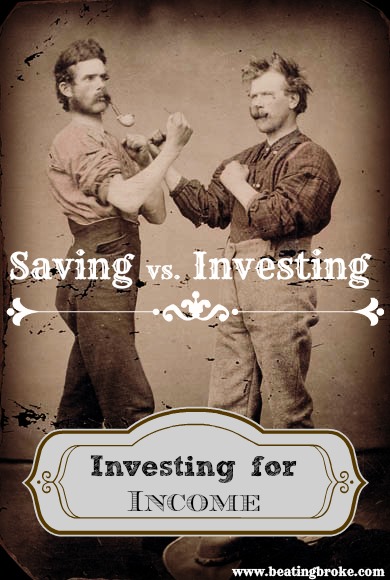One of the first things that you, I, or anyone else will likely worry about when contemplating quitting our jobs is the financial aspect of doing so. We’ll worry about whether we’ll be able to make enough money, on our own, to pay our bills. We’ll worry about whether that income, if it is enough, will be steady. We’ll worry about how we’ll make that money, and whether the income streams that we have are going to be robust enough to scale to a point where we can securely quit our jobs and work for ourselves. I know they were things that were foremost on my mind when I was deciding whether I should quit my job or not. In the end, I decided that it was time to let go of some of my fears and take the leap towards self-employment. Taking that leap was not an easy thing to do. Here’s how I was able to do it, and how you can too.
Get Your Finances in Order
Sounds simple, doesn’t it? It’s not. If it were, there would be a lot of personal finance bloggers who would be blogging about something else today, myself included. Despite what some people believe, personal finance isn’t a simple thing to master. I know I haven’t done it yet. I’m a little bit further along the curve than some, and further behind than others.
When I first started blogging about personal finance, it was during a very dark time in my financial life. My wife and I had been wondering if we were going to have to declare bankruptcy, and paying our bills each month was a juggling act. Somewhere in that time period, I discovered other personal finance blogs, and through them, Dave Ramsey. I ordered, and read Ramsey’s book, The Total Money Makeover.
It was the beginning of a financial turnaround for us. Ramsey’s book  gave us the financial know-how and direction to turn our finances around. With the help of that book, and the amazing community of personal finance blogs, our finances became something that was far less of a worry for us. That was over five years ago now. If we hadn’t had that turnaround, and gotten our finances in order, there is no way that I would have been able to do what I did. We have been aggressively paying down our debt and refusing new debt whenever possible.
gave us the financial know-how and direction to turn our finances around. With the help of that book, and the amazing community of personal finance blogs, our finances became something that was far less of a worry for us. That was over five years ago now. If we hadn’t had that turnaround, and gotten our finances in order, there is no way that I would have been able to do what I did. We have been aggressively paying down our debt and refusing new debt whenever possible.
When I Quit My Job
If you’re a regular reader here, you are familiar with the story leading up to the day I quit my job. We had become a bit lax in our financial governance, were about to buy a new house, and were suffering from a severe case of lifestyle creep. Our lifestyle had grown along with our incomes. We still were attempting to pay down our debt, and we were still avoiding new debt in most places, but we could have been doing so much more than we were. That’s our fault. We got comfortable with our income, got comfortable with the luxuries that we had let creep into our lives, and we lost sight of our end goals. The day that I decided to quit my job, we took all that back and started actively working towards our goals again.
In a way, quitting has been a blessing. It’s given us a renewed perspective on what we need, how much we need, and what we can do without. If you think you are going to quit your job or just want to quit your job, you can’t do it without having a firm grasp on your finances, and truly having them in order.
Cut Your Costs
Part of getting your finances in order, and a large part of being able to make it without the once steady income that you made at your job, is cutting your costs to a level that is sustainable, given your new income level. I went from a mid-5-figure-a-year salary with steady paychecks every two weeks to a part-time job that I get 20 hours a week at and an inconsistent online income. In the time since I quit, we’ve cut our costs dramatically. When I was still employed, we were spending nearly $6,000 a month. That includes debt repayment but is still a pretty large number. Now, we’ve cut our costs by about $2,000. If you had asked me in October of last year if we could do that, I would have said you were nuts. We found a way to do it and so can you. It’s all a matter of motivation. Do you have the motivation to cut costs so that you can give your dream the wings it needs?
Work Your Ass Off
Have your finances in order. Cut all the costs you can. None of that will amount to a hill of beans unless you are ready and willing to work your ass off. It’s something that I still struggle with. Every job you’ve ever had has conditioned you to expect to have someone telling you what you had to do. Everywhere you’ve ever worked, you’ve had a supervisor looking over your shoulder giving you the tasks that you were to work on, setting your yearly goals for you, and keeping you motivated to do them with the threat of unemployment. Once you quit your job, and decide to work for yourself, that all ends. It sounds freeing, doesn’t it? It is. And, it isn’t. You have to become your own supervisor. Your only motivator is to make your choice valid and make enough money to live off of. You aren’t going to get fired for spending 4 hours a day on Facebook anymore; You’re going to go broke. Scary, no?
As scary as that may sound, it is freeing. You’ll have the freedom to make the choice to work your ass off. It’s something that, even now, almost 3 months later, I still struggle with. There have been days where I haven’t done a damn thing. And, I’ve regretted each one of them. Each day spend screwing off has cost me potential money. If I don’t get anything written for this site or any of my other sites, it’s one less article that you’ll enjoy reading (I hope), and one less well-written article to attract new readers and new advertisers. Because of the long-lasting ability of any article that I write, the repercussions of a missed article can be exponential. What you choose to do, may not be writing content for websites, but you’ll likely see the same trend. And you’ll likely struggle to keep yourself on task without a supervisor. I’m learning, and you will too, that you have to provide that supervisory oversight for your new venture. It’s no longer a matter of keeping your job, but of keeping your bills paid, your heat on, and the foreclosure agent from your front door. Work your ass off.
Have a Little Hope (And Faith)
None of what I’ve said is the most important part of this. Without hope, you are destined to fail. You have to have hope that you will succeed. You have to have hope that you’ll overcome any mistakes you make. You have to have hope that you will prevail and make your venture grow roots and blossom. You have to have faith in yourself, that you can do the things you need to do to make your venture a success. Without hope and faith, you will fail. I can tell you, firsthand, that there are going to be days when both your hope and your faith will falter. There will be days that you feel like you’ve started on the trail to scale Mt. Everest. The air is getting thin, and all you want to do is, stop, turn around, and head back to the comfy, warm, job you had before. But, like anyone who has attempted to climb that mountain, you have to keep climbing. The trail may change directions from time to time, but the goal is the same. Find ways to renew your hope through community, family, and friends. I’m lucky enough to have a very supportive family, friends, and the community of personal finance bloggers to help me keep that hope and keep my faith. You can find that too.
Get your finances in order, dramatically cut your costs, work your ass off, and keep your hope and faith alive. Reach your summit.
photo credit: ilkerender

I started this blog to share what I know and what I was learning about personal finance. Along the way I’ve met and found many blogging friends. Please feel free to connect with me on the Beating Broke accounts: Twitter and Facebook.
You can also connect with me personally at Novelnaut, Thatedeguy, Shane Ede, and my personal Twitter.


